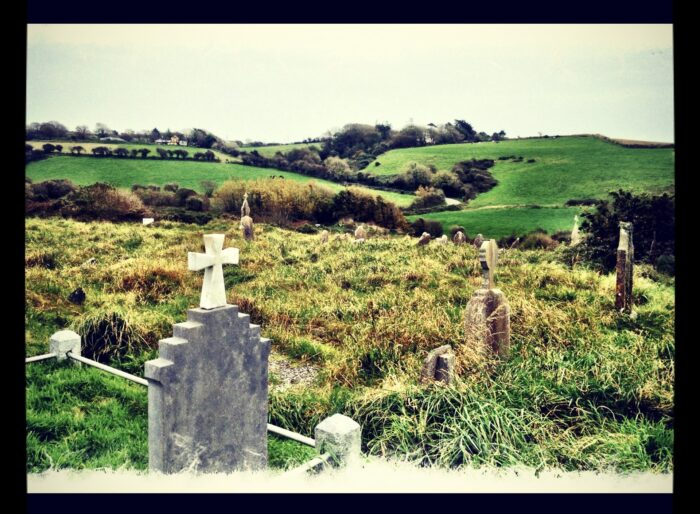Ireland has produced some of the greatest poets, novelists, songwriters and musicians in the history of the world. It is a culture guided by simple phrases and smiling limericks. A lyric here and there explains everything from the great mysteries of the universe to what to expect in the afternoon; more often than not a “soft rain.” Not “drizzle” as it was known where I grew up near Seattle that suggests a relentless canopy of depression, rather a more elegant and humane rendering that fosters a sense of well-being enveloped by a nurturing lifeforce. Therefore: “soft rain.” The Irish know how to keep a wall between joy and suffering. Suffering is always lurking, why give it a perch upon which to prosper? Perspective is everything.
The Irish are known for their perseverance founded in perspective. Whether at the hands of British oppressors, the despair of a relentless famine, or the sadistic perversions of wayward nuns and priests, the Irish have endured. “Irish luck” may be the greatest oxymoron in the world, giving rise to the old saying, “if I didn’t have bad luck, I wouldn’t have any luck at all.” The contemplation of luck in Ireland is actually their whimsical way of mocking reality. Alas, only tourists kiss the Blarney Stone and wish on shamrocks. The Irish are often seen by Americans as though they expect to be punished—that they deserve to suffer. When I was a student at University College Cork in Ireland, I misunderstood their sense of fate as weakness, which I now understand as extraordinary strength and timeless wisdom.
In part, the Irish come to accept their fate as a product of their Catholic indoctrinations. After all, sinners (meaning everyone) deserve their suffering and punishment. Unlike Protestantism, Catholicism doesn’t allow the prospect of direct relations with a merciful God. Martin Luther’s sixteenth century concept of disintermediation—reducing the role of the church between man and God—which runs as a thread through his ninety-five theses (and later came to mark the period of Protestant Reformation), were never adopted by the papal collectors of simony who preserved their right to forgive indulgences (for a price) as a way to fill church coffers. Money (then as now) remained a prerequisite to mercy. The pope, and through him, the parish priests, are God’s only earthly authority in the Catholic version of Christianity. Irish Catholics accept the word of God from the robed ones in funny hats; any attempt at theological interpretation by parishioners is considered a fool’s errand. However, accepting sacrifice and anguish is more than a cultural condition promoted from the pulpit on Sundays. It also gave rise to the Irish secret weapon in forging a meaningful life: rethinking the relationship between life and reality.
Rather than fight with reality as most Americans do, the Irish aim is to simply manage their relationship—through the power of reflection—with a reality they see as mostly immutable. We Americans are taught to regard perseverance as something we are forced to do if we neglect the imperative to bend reality in our favor. We believe in our ability to be masters of our destiny (the facts be damned). Unlike Christians in America who pray to change circumstances and outcomes, the Irish pray as a matter of resolve to deal with things as they are. Americans grieve about what isn’t so, while the Irish deal with what is so. Whereas Americans regard acceptance of circumstance as a character flaw, the Irish know it is a sign of strength as resilience. The Irish take the world before them and accommodate it in a manner that minimizes suffering while preserving their dignity. That is how drizzle becomes a soft rain, hunger fortifies the soul, and humility (and confession) fill and smooth the cracks of transgression. It is their relationship with reality that is important, not reality itself. That is their secret weapon.
The key that opens the door to this relationship management skill—a cultural asset of the Irish—is reflection. While perspective is the foundation of perseverance, it is only possible through reflection. The basis of reflection is time and thoughtfulness, also known as deliberation. It not only allows better decision making, it fosters a creative process to support their wordcraft and music. Considering all aspects of every challenge from every angle and in consideration of both costs and (often hidden) benefits, the Irish create the opportunity for making lemonade when life hands them lemons, rather than the American proclivity for making mountains out of mole hills. Some might argue they have no choice while our American life is advantaged by greater leeway to satisfy our needs and avoid unwelcome consequences. Fair enough. Americans do have many advantages over the Irish (and most of the rest of the world). But how often do we Americans successfully bend reality to meet our desires, when we (and those around us) might have been better off simply adjusting our relationship with that same reality? Incessantly pounding square pegs into round holes has its own subtle, yet grinding, consequences.
Desire is, as both Buddha and Christ held, a sure pathway to suffering. Desire inherently demands change from the actual to the preferred. Americans often waste desire on superficial materialism that comes with lots and lots of packaging to satisfy mostly transient wants, while the Irish save desire for more moderate elements of life: a pint of stout, freshly baked soda bread, a warm heart, and a tune to weave them all together. Behind that Irish preternatural calm—that expressionless resolve—lies not the weakness of resignation; rather, the enduring resilience of timeless wisdom. As the Serenity Prayer intones, wisdom lies in knowing the difference between what can and cannot be changed. Ignoring such wisdom nearly assures suffering.
The key to happiness and fulfillment in the Irish life is sitting on the top of the wall between joy and suffering without falling to either side. This is the balance, or harmony, of equanimity—the calm state in the middle of the maelstrom that is the reality of life. They take life as it comes without chasing elements they do not control. They call it the Serenity Prayer for a reason. Can you imagine how much time this frees up for them? Without trying to twist and bend reality to their will, they have time to write, to laugh, to sing, and to care for all those children the church requires to keep its theological (and economic) Ponzi scheme alive.
It is argued that the path to transcendence is getting rid of the stuff—from material wants to our emotional and psychological hang-ups—that block one’s liberation to realize an open and fulfilling life. Spiritually constipated Americans take note: sit down with your eyes wide open, shut your mouth, let your ears get some playing time, breathe deeply through your nose, and let life come to you on its own terms. Foster a healthier relationship with reality. And, when you are ready, sip a Guinness. Do not chug it, sip it. It is not a Big Gulp, it is nourishment. It enables reflection and soothes the soul. After a couple, you may even sing like an Irishman. Or, write a piece titled “The Luck Zen of the Irish.”
Cheers.






